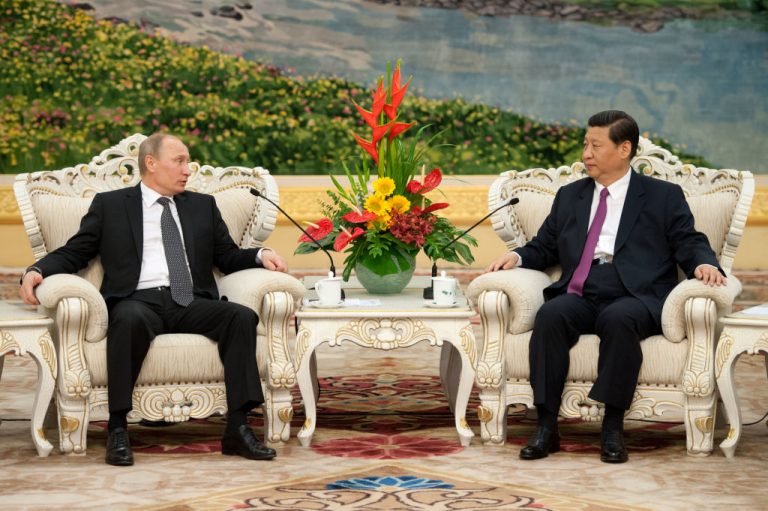On July 15, Russian foreign minister Sergey Lavrov met with his Chinese counterpart, Wang Yi, with both agreeing that bilateral relations between the two nations were “the best ever.” They were attending an international conference in Tashkent titled “Central and South Asia: Regional Connectivity, Challenges, and Opportunities.”
At the meeting, the Russian diplomat cited the June 28 joint statement issued by Russian President Vladimir Putin and Chinese leader Xi Jinping. The statement was made following a videoconference between Putin and Xi as part of the 20th anniversary of the Treaty of Good-Neighborliness and Friendly Cooperation signed on July 16, 2001.
“Let me single out the quote from the statement, which stipulates that our ties today outpace the form of inter-state interaction that was the military-political alliances of the Cold War period. This is the most essential benchmark for our relations in all areas without exception,” Lavrov said at the meeting.
“While not being a military and political alliance, such as those formed during the Cold War, the Russian-Chinese relations exceed this form of interstate interaction,” the joint statement said.
Their bilateral relationship is not “opportunistic,” is free from “ideologisation,” and observes “non-interference” in each other’s internal affairs. The joint statement went on to say that both countries had “resolved the border issue” and have “no mutual territorial claims.”
Success
You are now signed up for our newsletter
Success
Check your email to complete sign up
In a July 15 video conference, Vitaly Fadeev, senior counselor at the Russian Embassy in China, also endorsed strong ties between the two nations. “The Russian-Chinese relations surpass the traditional military-political alliances when it comes to their effectiveness and stability, with the flexibility that helps support this format of relations,” Fadeev stated.
Although Russia is promoting the idea of a stable, friendly relationship with China, critics believe the reality is far different. Geographic, military, and economic conflicts are reportedly mounting between the two nations.
Geographic competition
Chinese business expansion into Russian territory has sparked concerns of a potential takeover. In Russia’s sparsely populated Far East region, Chinese-funded projects are being increasingly viewed as threats. A 2019 report by The Wall Street Journal cites locals calling the influx of enterprises a “Chinese invasion.”
In 2019, Siberians held major protests against a Chinese water bottling plant that sourced water from Lake Baikal. A petition asking for the removal of the plant collected a million signatures. According to Siberian environmentalist Alexander Kolotov, locals were afraid that “China will gulp down our national heritage,” reported France24.
Protests have also erupted against Chinese timber logging in Siberia, with some fearing that such activities will lead to the destruction of the forest. In a 2016 article, Russia expert Stephen Blank warned that “not only has the modernization of the RFE (Russian Far East) run aground, the tie to China is becoming an alliance where Russia depends more on China than China does on Russia.”
Central Asia is another area of contention between Russia and China. Russia has traditionally viewed countries like Kyrgyzstan, Kazakhstan, Uzbekistan, Turkmenistan, and Tajikistan as within its sphere of influence. However, China is strengthening its hold over the region through Belt and Road initiative investments. Some media outlets have criticized Beijing for interfering in the affairs of Central Asian nations, accusing the Chinese regime of bribing local officials.
Military and economy
Trade between Russia and China has flourished in recent years. In 2020, bilateral trade exceeded 100 billion dollars for the third straight year, with China serving as Russia’s largest trading partner for the 11th consecutive year. Russia’s agricultural and energy exports have risen, complementing China’s growing demand for the products.
However, the trade agreements have come with strings attached. For one, Russia has apparently been forced to sell gas at lower prices. After the annexation of Crimea in 2014, Russia had to face sanctions. Putin signed a 400 billion dollar annual natural gas supply deal with China. Experts believe that China was able to decrease prices to more favorable amounts.
In addition, China buys many Russian imports with its national currency, the Chinese yuan, rather than with dollars or euros. While local currencies were seldom used for Russian deals in 2013, local currencies made up 25 percent of settlements in 2020. By accepting the Chinese yuan as payment, Russia was positioned to buy goods from China in the future. Russia’s yuan reserves rose from 5 to 12 percent in the two-year period between 2018 and 2020.
In terms of the military, though both countries have participated in joint exercises, Russia has been displeased by China’s theft of its military technologies. In 2019, Yevgeny Livadny, chief of intellectual property projects at Russian state-backed holding company Rostec, called China out for its criminal activities.
“Unauthorized copying of our equipment abroad is a great problem. There have been 500 such cases over the past 17 years. China alone has copied aircraft engines, Sukhoi planes, deck jets, air defense systems, portable air defense missiles, and analogues of the self-propelled medium-range surface-to-air systems Pantsir,” Livadny said, as reported by TASS.
In addition, Russia’s military has supported India against China. Following the China-India skirmish in the Himalayan border last year, Russia supplied India with advanced weapons. Russia is also helping India in the development of highland tanks, submarines, and fifth-generation aircraft.
Though Russia does have an edge over China in terms of military technology, the gap is quickly eroding. According to some estimates, China will catch up to Russia within five to ten years. A China that is militarily superior to Russia, with an economy almost ten times larger, will pose huge problems for Moscow.















